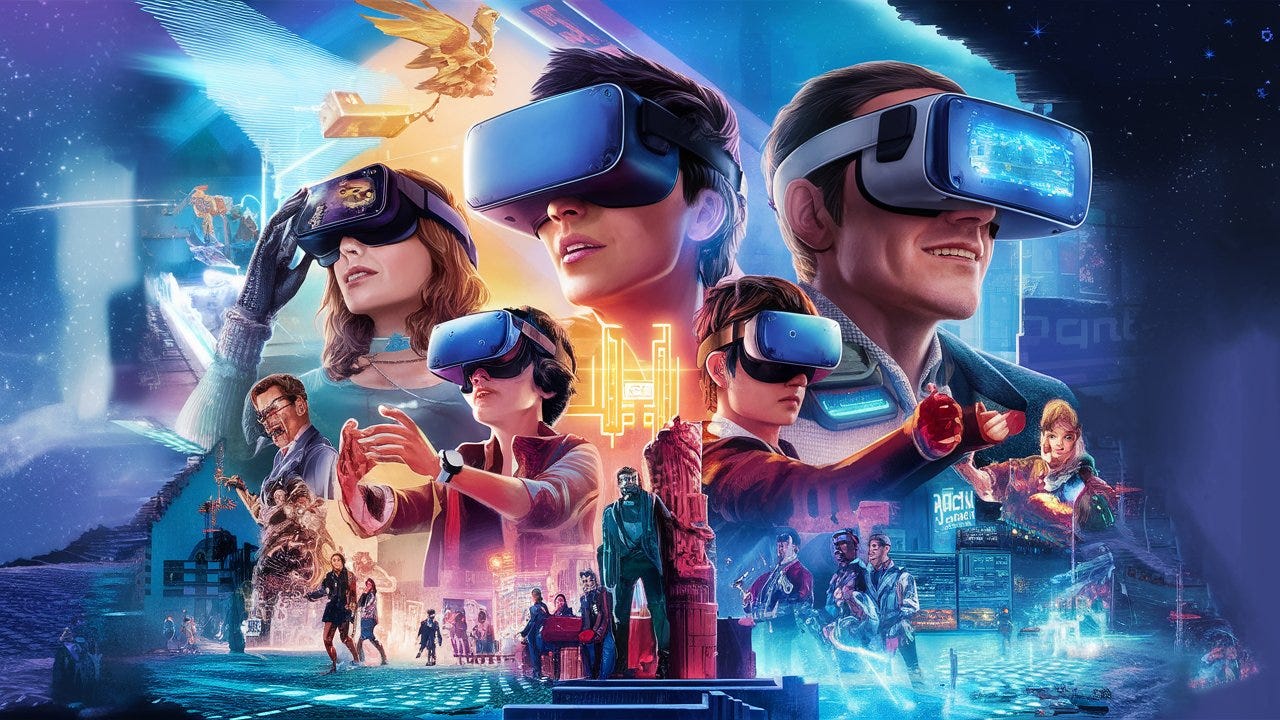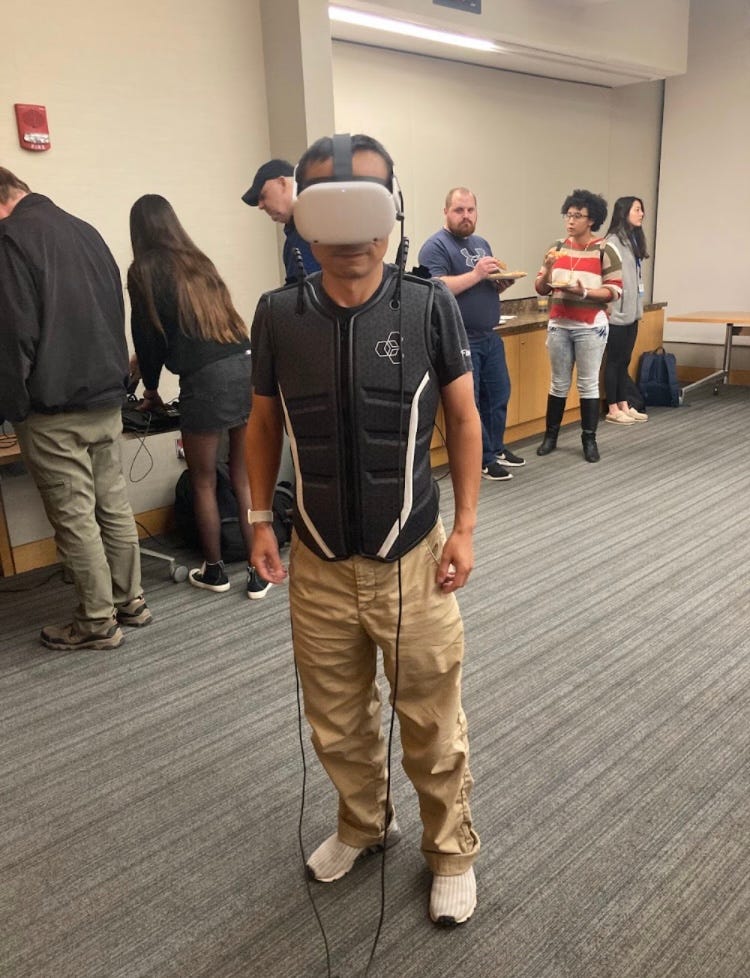Boston VR Newsletter - September 2024 Edition
Monthly Socials, Crafter's Corner, Meta Connect, and More...
Monthly Socials!
The organizers and volunteers of Boston VR are continuing our monthly socials at TimeOut Market.
The next social event is on October 7th at 7 pm.
Click here to RSVP!
Let's animate a train in Blender!
RSVP for the next session: Sunday, September 29th
It’s hosted by the awesome John Gagan, an experienced web developer, and artist, who has seven years of experience with Blender, four of which he spent as the head of the Boston Blender Group. He has degrees in Art and Computer Science and has combined these interests by studying Unity and Blender.
This dev jam is your chance to learn about Blender or sharpen your skills!
For more info, click here to RSVP for the event!
Details:
*Please bring your laptops, as this is a hands-on demo.
Watertown Public Library, Room: Lucia Mastrangelo Meeting Room
Description: The event is on a SUNDAY this month. This event is run though the Boston Virtual Reality Meetup Group. At the September meetup, Erik Nelson will give a demo on how to create a train, train tracks and an environment in Blender. He will then show us how to animate the train, from the point of view of a person inside the train looking out the front window. Here is a link to the completed train animation:
To view the finished train animation:
Crafter’s Corner – How do you craft for VR?
Welcome back to Crafter’s Corner, the section of the newsletter where we discuss how to make content for VR. In the previous newsletter, we went through a quick overview of the top hardware running VR in 2024, describing some of the similarities and differences between the Meta Quest, Apple Vision Pro, and PCVR devices. And real quick, before we leave the topic of hardware, we should note that in just a few days we expect Meta to reveal the next devices in its VR lineup during their September Connect event on September 25th & 26th. It’s a pretty safe bet that Meta will be officially revealing the “Quest 3S” during the event, which is expected to be a cheaper version of the Quest 3 that will replace the Quest 2 in Meta’s lineup and will provide better mixed reality support than the Quest 2 does today. An open question is how close Meta’s Ray-Ban smart glasses are to having a full OS capable of running MR in them, but most analysts expect that is still more than a year away.
Moving on to today’s main topic, we turn from hardware to software to examine the type of content one can build for VR. Aspiring VR crafters have two approaches to making VR content. The first is to leverage some application already built in VR that provides tools to allow others to create content within it or to upload content into it. The simplest of those is simply 3D images or video, where with special cameras and video recorders people can capture the world around them and upload the images and videos into VR players like YouTube VR. Also in this category are applications, like Roblox and Meta Horizon Worlds, which allow users not only to enter many different experiences (called something like “rooms”, “islands”, “spaces”, or “worlds”), but they also provide tools for people to build their own experiences in the application for others to enter.
The second approach to building VR content is to build a dedicated application that is designed to run in VR. This approach is more work for the crafter, but with time and training, the experiences they can build are limited only by their imagination. Building these sorts of applications leverages a lot of the same types of tools that are used to build non-VR or “flat” experiences for computer screens, such as tooling to build the visuals for the experience and some engine in which to tell the computer or VR system the details of how your experience should behave.
No VR experience would be very interesting without those 3D visuals, and these require specialized 2D and 3D software to craft. While making 2D images and 3D objects takes practice, the good news is that it has never been easier to get started. There are great tools available for free today, such as Krita for 2D art and Blender for 3D objects, and thousands of hours of free video tutorials online as well as classes for a small fee from sites like Udemy. For those who want to jump in right away, there are many free 2D and 3D assets that artists have shared online that are available for download with unrestricted use, and many more available for sale in asset stores such as SketchFab for low cost.
These tools are all a creator needs if they want to build 3D animation, but if they are looking to build a VR experience, the 3D objects built in these tools need to be saved and loaded into an engine which knows how to load the object into the crafter’s 3D world where people will be able to interact with it using their VR headset. As with the visual creation tools, now is a great time to jump in to learn the game engine tools as well, because there are three major engines that are available today for anyone to use, and all three are free to get started in, extremely powerful, and have a ton of online tutorials around them. The engines are Unity, Unreal, and Godot, and we will discuss each in more detail in future articles.
There are many more things that a crafter will need to explore when creating an experience, such as sound, lighting, and the behaviors the crafter wants their experience to have as someone is interacting with their experience, but visuals and an engine are big enough projects that we can leave the discussion there for now.
Next time we will take a closer look at Blender, the free 3D design tool and what goes into crafting 3D objects for VR experiences. Thank you for reading and we’ll see you next time.
Justin is a long-time software engineer who specializes in cloud and VR development. He can be reached at https://archmag.us or justin@archmag.us
Wondrium (Formerly known as the The Great Courses): Imagining Tomorrow’s Entertainment
In Imagining Tomorrow's Entertainment, you will meet expert Eric R. Williams, Professor of New Media Storytelling and Emerging Technologies at Ohio University, where he heads up the cinematic virtual reality arm of the Game Research and Immersive Design (GRID) Lab. Eric will take you on a 10-episode tour beyond your wildest dreams and into the future of entertainment. Your mission during this journey will be to find out what is possible and probable in this rapidly approaching future. You will also have fun testing out these new technologies for yourself.
The world of entertainment is constantly changing and evolving. Today, we are no longer leaning back to consume our favorite stories. Instead, we are leaning forward and actively participating in their creation. This is XR, or Extended Reality, which is an umbrella term under which several other entertainment technologies reside, such as:
Augmented Reality (AR),
Virtual Reality (VR),
Mixed Reality (MR), and
Augmented Virtuality (AV).
XR also includes everything else in between these five terms. Think holograms, video games, and even 360-degree interactive movies. The landscape is shifting beneath our feet—and into our hands, heads, and bodies.
Book of the Month:
Your first step to understanding what the metaverse is all about
You've probably heard that the metaverse―a word that seemingly went from nonexistent to everywhere ― is the next big thing in technology. What is it, anyway? Written by a leading futurist, Metaverse For Dummies unravels the mysteries of the metaverse, for the curious and for anyone looking to get in on the ground floor. Discover how to carve out your niche in the metaverse with easy-to-understand breakdowns of the major technologies and platforms, a guide to doing business in the metaverse, and explorations of what meta means for sports, education, and just about every other area of life. The book even gives you a guide to safety in the metaverse, including how much of your real life you should share in your virtual one. This book answers all the big questions about the metaverse, in simple terms.
Explore the metaverse and the major players
Get a look at how the metaverse will disrupt industries from gaming to online commerce
Discover business opportunities on the metaverse
Dive into metaverse gaming and virtual events―safely
September 25-26
Click here to register:
Stay tuned for our next newsletter for more updates, highlights, and community stories. Let's keep exploring the infinite possibilities of extended reality together!
Boston VR is committed to fostering a welcoming and innovative community for XR enthusiasts and professionals.
Whether you're a developer, creator, researcher, or just plain curious, we're excited to explore the future of XR with you.
For more detailed discussions and to share your thoughts or experiences, don't hesitate to join us at our next meetup or reach out through our community channels.
See you in the virtual world!
Join the Boston VR Slack
To join, click here
Would you like to spotlight your VR project to inspire creativity in our community? Email Chris at chris@bostonvr.org with a short description of your project and why it should be included in the newsletter.
Interested in Volunteering with Boston VR?
Email Casey We need help with marketing, event planning, dev jams, sponsorship, and more!
Thank you to our Premium Sponsor, AMXRA!
AMXRA is the premier medical society advancing the science and practice of medical extended reality, https://amxra.org/.
AMXRA has generously committed to being a premium sponsor for Boston VR over the coming years. We are immensely grateful for their support and partnership in exploring the forefront of XR technology.
















